Strength, Stability, Balance, Endurance
January 31st, 2023 by Global Down Syndrome Foundation
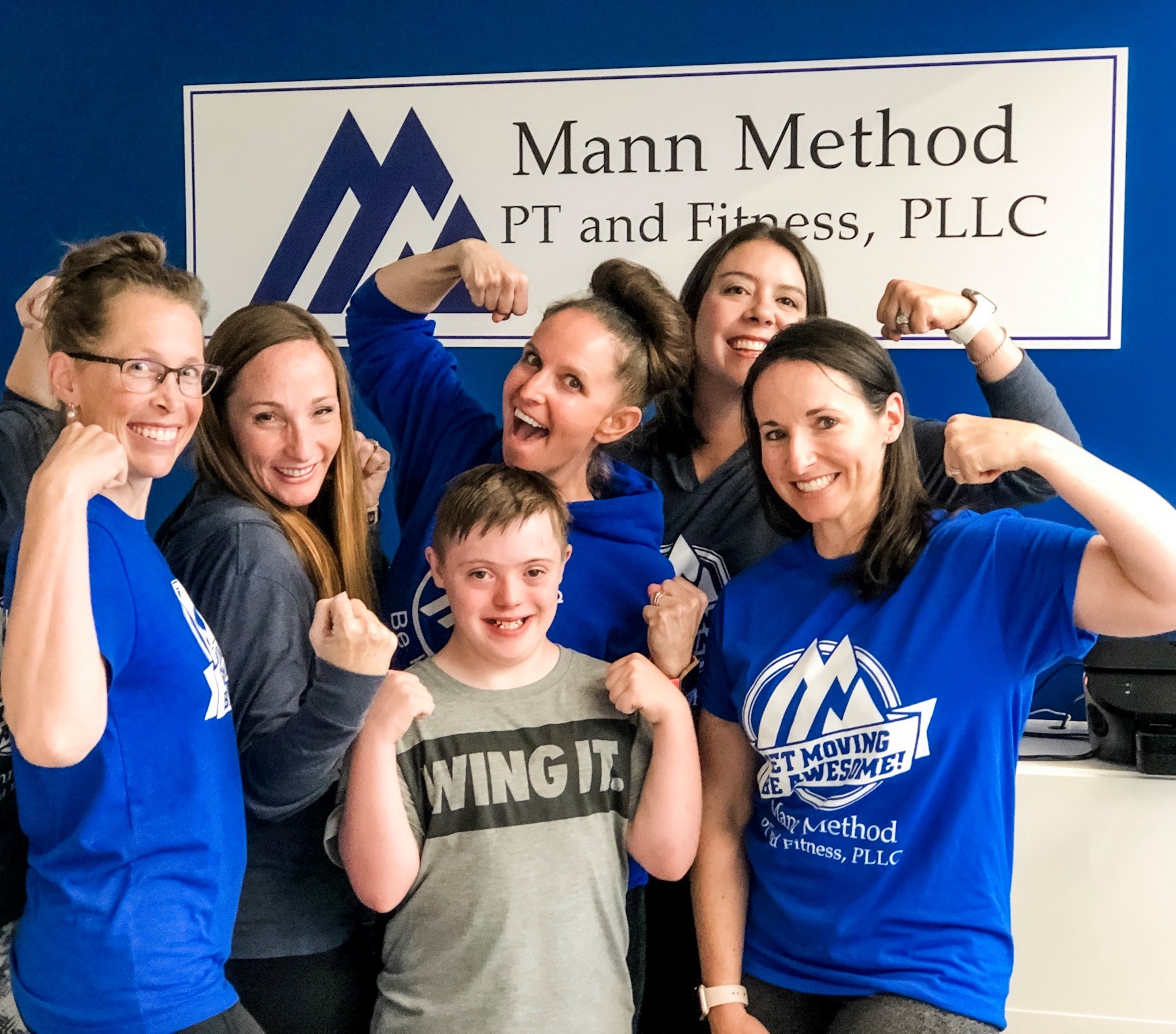
Physical therapists share preventative PT techniques for people with Down syndrome
From Down Syndrome World Issue 3, 2021
“Often times people think of physical therapy (PT) as a place to recover from an injury, like learning to walk after a broken leg. Physical therapy is unique in that we can help when things are hurting, but also provide targeted interventions with the purpose of prevention,” says physical therapist Dr. Sarah Mann, PT, DPT, MBA, NSCA-CPT, founder and CEO of Mann Method PT and Fitness, PLLC and Mann Therapies. “With PT, we encourage listening to the body and taking early action to create healthy and sustainable habits that, over time, can reduce potential problems in the future.”
People with Down syndrome have a unique physiology that impacts their musculoskeletal and cardiovascular systems. Characteristics such as low resting muscle tone, flat feet, joint instability, and low cardiovascular endurance can cause problems like obesity, joint pain, and fatigue. PT addresses physical issues at their root level, first building on the underlying foundational motor skills and then honing those skills to strengthen specific areas of the body. Results include healthier weight management, increased strength, improved balance, increased bone density, improved bowel movements, decreased rates of arthritis and osteoporosis, and ultimately lower levels of pain and fatigue. In turn, this leads to increased motivation for physical activity, improved social functioning with peers, and overall sense of well-being.
Down syndrome physical therapy experts Dr. Sarah Mann, Dr. Patricia Shimanek, and Dr. Kia Mattison share their PT strategies and techniques to address common physical issues experienced by individuals with Down syndrome.
Strength, Stability, Balance, Endurance
“Movement should be purposeful,” says Dr. Mann, who emphasizes four key training areas in her PT method: Strength, Stability, Balance, and Endurance. “After working with hundreds of individuals with Down syndrome and learning how they often respond to various exercises, I find that exercise programs combining these four categories are the most effective in addressing impairments and helping prevent future complications.”
Her physical therapy program, called the Mann Method™, combines foundational movements, hip strengthening, vestibular, and cardiovascular training to focus on multi-joint movements that activate the feet, knees, hips, trunk, and core. Foundational exercises like squats help build muscle and improve function, while balance exercises like lateral tilts help improve weight shift for walking. Progressive sequencing through these various exercises helps build cardiovascular endurance.
“Repetition is a great way to ingrain certain movements into muscle memory,” says Dr. Patricia Shimanek, PT, DPT, an orthopedist at Advocate Aurora General Hospital and mother to a 25-year-old son with Down syndrome. “When my son does push-ups, for example, sometimes he will arch his back too much or hyperextend his elbows. The more he practices the correct form, the better he is able to recognize when and how he needs to move his body to get there.”
Start with the Feet!
Before attending your first PT session, the experts advise to first check your feet! 91% percent of people with Down syndrome have a flat-foot position, which can cause painful misalignments, bad posture, joint pain, and poor proprioception (awareness of body position and movement).
“A reason a lot of adolescents complain of knee pain may be because they’re wearing the wrong footwear. When your foot hits the ground, if it’s not contacting the ground appropriately, it changes the mechanics all the way up effecting the knee, hips, back, and neck,” says Dr. Shimanek. “A quick change in shoes can make a world of difference, helping them to stand up a bit taller, keep their head up, and improve musculoskeletal strength.”
There are many orthotic support options that can be added to your shoes, such as cushion insoles, custom arch supports, and more. If shoe supports do not provide enough stability, PTs can also evaluate for higher level orthotic needs.
Techniques
“Consistency is hugely important to a successful PT program,” says Dr. Kia Mattison, PT, DPT, Director of Physical Therapy at Cobblestone Therapy Group in Roswell, Georgia. “With children, it helps to develop a reward system that encourages this, such as a couple of PT exercises means a couple minutes of playtime. The PT should also collaborate with the patient’s full care team to ensure routines are being practiced and reinforced in various settings.”
Dr. Mattison also advises taking things slow. “Take things one step at a time to allow the individual to gain a mastery of one step before moving onto the next one,” she says. “However, progress takes time and can build slowly over several weeks or months. Make sure to celebrate all the milestones big and small!”
Drs. Mann, Shimanek, and Mattison agree that physical therapy is a lifetime investment. It is not meant to be a temporary intervention that fixes a problem, but instead a training process that builds skills and improves functioning over time.
GET MOVING!
See below exercise modules from GLOBAL’s Webinar with Dr. Sarah Mann “Strength, Stability, Balance, and Endurance – Purposeful PT for Teens and Adults with Down Syndrome.”
To learn more, visit…
Mann Method PT: www.mannmethodpdt.com
Cobblestone Therapy Group: cobblestonetherapy.com/physical-therapist
GLOBAL’s PT Webinar with Sarah Mann: globaldownsyndrome.org/global-webinar-series-spring-2021
Like this article? Join Global Down Syndrome Foundation’s Membership program today to receive 4 issues of the quarterly award-winning publication, plus access to 4 seasonal educational Webinar Series, and eligibility to apply for Global’s Employment and Educational Grants.
Register today at downsyndromeworld.org!
2023 January GLOBAL Newsletter
January 30th, 2023 by admin
GLOBAL Receives Kroenke Sports Charity Grant, Our Newest Quincy Jones Awardee, World Down Syndrome Day, and more – Your January Newsletter!
Going for Gold: Elana Meyers Taylor & Nico Taylor
January 10th, 2023 by Global Down Syndrome Foundation
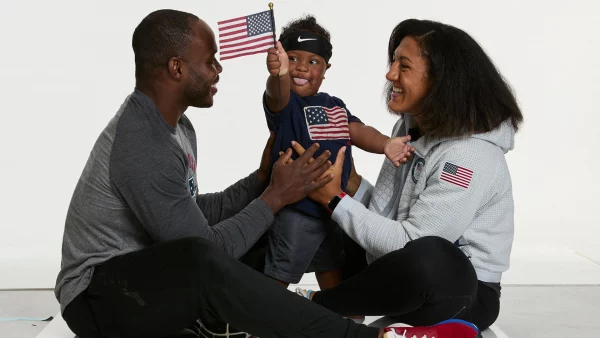
From Down Syndrome World Issue 3, 2022
ELANA MEYERS TAYLOR, has collected numerous inspiring accolades throughout her life. She is perhaps most known for making history in the 2022 Beijing Olympics, receiving her fifth medal (she has three silver and two bronze) in bobsledding. Taylor is the most decorated black Olympic winter sports athlete and the most decorated U.S. Olympic bobsledder of all time. This is an impressive feat for anyone to accomplish, and Elana did it all while raising her beautiful son, Nico, who has Down syndrome.
Like most children, Elana had big dreams for her future at a young age. Since seeing the 1996 Summer Olympic Games in her hometown of Atlanta, Georgia, she knew she wanted to be the one standing on the podium one day. A renaissance athlete, she participated in sports throughout her childhood and well into adulthood. As a kid, she played softball, basketball, track & field, and soccer, all with the intention of becoming an Olympic athlete one day. She went on to play collegiate softball at George Washington University and played professionally after college as well. With all this work building toward her dream of becoming an Olympian, Elana felt immense pressure during her tryout for the US Olympic Softball team. “I put the weight of the world on me and just completely choked.” Taylor stated, “I just couldn’t handle the pressure and thought it was going to be my only chance to live my dream.” This setback allowed her to set her sights on a new sport to carry her to the Olympics.
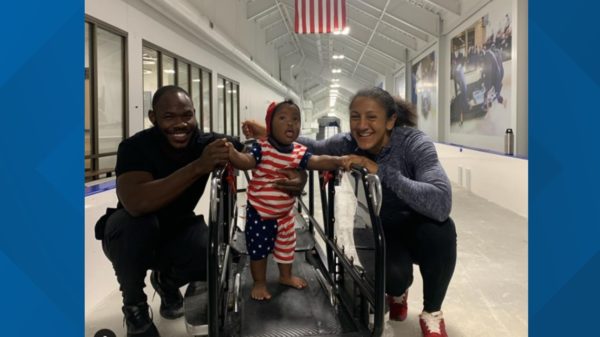
Taylor’s parents, Eddie and Janet Meyers, suggested she check out bobsledding as an option, and even though she knew nothing about the sport, she decided to give it a shot. Her natural athleticism propelled her through the first round of trials where she could then hone her technical skills to make her a strong competitor in bobsledding. After competing in the U.S. National Team trials and World Cup tour, she qualified to race in the World Championship race within her first year as a brakeman.
Her triumph in the World Championship races as a brakeman allowed her to start racing in the front seat as a driver, and from there she began her legacy as a bobsled icon, making her debut on the U.S. bobsled team at the 2010 Vancouver Olympics. She has continued to compete in the two-woman and Monobob races at the Olympic level, and even qualified to race on the men’s four-man bobsled team!
Elana’s story of success in making her way to the Olympics and earning such honorable titles along the way is admirable on its own, but her work does not stop there. Elana is a devoted advocate for women of color competing in the Olympics and uses her 5-medal status to get her foot in the door and initiate change at a higher level. “Other people like to scream and shout and, you know, take to social media and stuff like that. That’s not really my cup of tea.” She prefers to do her work behind the scenes by having these difficult conversations about equity for women of color in sports with the higher-ups in the Olympic committees, pushing for that positive change. It is clear, that Elana has a passion for advocacy and creating space for marginalized groups to excel, and this passion grew even stronger with the birth of her first son, Nico.
Becoming a Mother and an Olympic Athlete
Amid the rise of her Olympic career, Taylor and her husband, fellow Team USA bobsledder Nicholas Taylor, became pregnant with their first child, Nico, who was born at the start of the COVID-19 pandemic in 2020. Following her silver medal-winning run at the 2018 Winter Olympic Games in Pyeongchang, Taylor was unsure if she wanted to compete in another Olympics. She was already a 3-time medal winner and was feeling content with the progress she has already made in her bobsled career. “You can only be driven so much by a gold medal,” stated Taylor. However, the news of her pregnancy sparked a new kind of motivation in Taylor that she did not quite expect. Competing at the Olympic level while navigating pregnancy and becoming a first-time parent was a new challenge that she was determined to take on.
Elana and her husband continued training throughout her pregnancy, adapting a garage in their apartment building into a home gym to get their training schedule back on track. Less than 6 months after Nico was born, Elana was already working towards making the U.S. National Team and eventually competing in the 2022 Winter Olympics. Nico was along for the ride every step of the way, traveling to Lake Placid with his mother to train and cheering her on from the sidelines at competitions across the globe.
Wherever Elana was, Nico went too. She wanted to show the world that just because she is now a mother, let alone a mother of a child who is differently-abled, she is still a force to be reckoned with in her sport. Her new-found motivation from her son and desire to prove to the world that motherhood does not have to thwart a lifetime of progress drove her to the 2022 Winter Olympics in Beijing, where she earned a silver medal in the women’s Monobob event and bronze in the women’s 2-person bobsled. Now, as a 5-time medalist in bobsledding, her goal is to use her status to uplift and advocate for other women in sports—especially women of color—to fight for equality and serve as a beacon of hope that change is possible.
Taylor’s Experience Raising a Child with Down Syndrome
For most people, having a child at the start of a global pandemic, receiving the Down syndrome and significant hearing loss diagnoses, and a tiresome, eight-day extended stay in the NICU, would be overwhelming. But Elana and Nicholas Taylor did not falter for a second. The Taylors’ athlete mindset helped them make a plan of action to provide Nico the best care possible while still being able to train for and compete in the upcoming 2022 Olympics.
Taylor brings Nico along with her to all her events to show that children with Down syndrome can live normal, happy lives, and more importantly, be an example to her son that you can go out and achieve your goals regardless of what the world is telling you. “We were like, okay, now the rest of the world’s going to tell him he can’t achieve stuff,” Taylor stated. “The rest of the world’s going to tell him ‘No’. Just like they tell female athletes ‘No’. Or they tell moms ‘No, you can’t achieve certain things and you can’t do certain things.’ I want to be there for him and make sure he knows the opposite is true.” Taylor never let skepticism steer her away from accomplishing her goals, and now hopes to pass on that unwavering mindset to Nico.
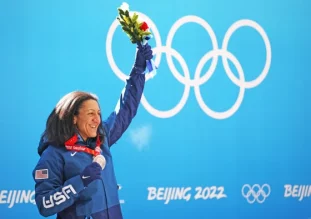
Many people formulate incorrect assumptions about individuals with Down syndrome based on outdated stereotypes. Due to advances in research, medical care, and inclusion, an increasing number of adults with Down syndrome in the U.S. are going taking post-secondary classes or going to college, getting jobs, playing sports, working, getting married and living semi-independent or independent lives.
As a mother, Taylor hopes that her son can see the obstacles she has overcome in her career to inspire him to chase his dreams without hesitation. “If I could advocate for anything to the world, it is to show that our kids have worth, that they can be important and valuable members of our society, and that the people with Down syndrome in our lives should have the same respect and opportunities as anyone else.”
Taylor’s Advice to Families of Individuals with Down Syndrome: “You Are Much Stronger Than You Think”
Parents of children with Down syndrome have some extra hurdles to navigate throughout their child’s life, but these are not infeasible challenges. Therapy, doctor visits, and assisting with daily living tasks can be daunting responsibilities but are not unmanageable compared to the needs of a typical child. Taylor encourages families who either currently have or are about to welcome a child with Down syndrome into their lives to look past the negativity that is so often thrown at them from the outside world and to know that living with a person with Down syndrome is a gift in itself. “I think all of us have that ability inside of us,” Taylor mentions, “just most of us don’t realize we do”.
Taylor and her husband go above and beyond to provide the best for Nico, and when faced with challenges that seem impossible or overwhelming, they are reminded that Nico is a child like any other, and their job as parents is to simply love and support him unconditionally. “Just trust your own abilities and know that you are much stronger than you think.” The Taylors’ unwavering love for Nico has helped them face these new circumstances head-on and accept that while their situation is not a typical one, they can still achieve their goals as a family. Much like Taylor’s unexpected path to the Olympics—averting her original plans of playing softball and taking on a completely new sport—her experience raising Nico has brought her and her family more gratification and joy than they ever could have imagined.
Advocating for a Brighter Future for those with Down Syndrome
Great strides have been made to reverse the harmful, outdated assumptions about people with Down syndrome in society, but there is still a lot of work to do. Many health and medical concerns associated with Down syndrome still do not have adequate research and funding dedicated to them. At GLOBAL, the mission is to significantly improve the lives of people with Down syndrome through research, medical care, education, and advocacy. In 2021, Elana Myers Taylor attended the GLOBAL AcceptAbility Gala in Washington DC and inspired the audience with her work on inclusion and with her powerful speech made with Nico in her arms.
She is clearly someone who leads by example and works to open doors for individuals who are differently-abled in their communities. At the event Taylor announced that she was proud to be an official GLOBAL International Spokesperson joining the ranks of Quincy Jones, Jamie Foxx, John C. McGinley, Frank Stephens, Kyra Phillips, Beverly Johnson, and Amanda Booth. As an International Spokesperson and member of GLOBAL’s Champion Advisory Board, Taylor will work every year to advocate in Washington, DC, her hometown of Atlanta, and around the world.
“I’m so honored and excited to be part of an organization that in a very short time has succeeded in advocating for increased federal Down syndrome research funds,” Taylor says. “We need to have both sides of the aisle advocating for our kids and to come up with a plan to address lifespan and health disparities for black people with Down syndrome as well. Our kids deserve equity, respect, inclusion, and the right to live safe, happy and productive lives.”
Clearly the Down syndrome community has a formidable ally and a new leader in Taylor who understands how to work hard and create real change.
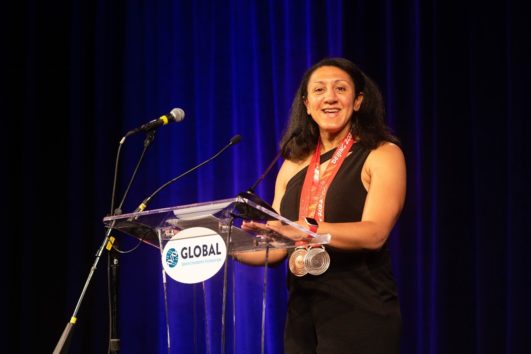
Like this article? Join Global Down Syndrome Foundation’s Membership program today to receive 4 issues of the quarterly award-winning publication, plus access to 4 seasonal educational Webinar Series, and eligibility to apply for Global’s Employment and Educational Grants.
Register today at downsyndromeworld.org!
test
January 5th, 2023 by Global Down Syndrome Foundation




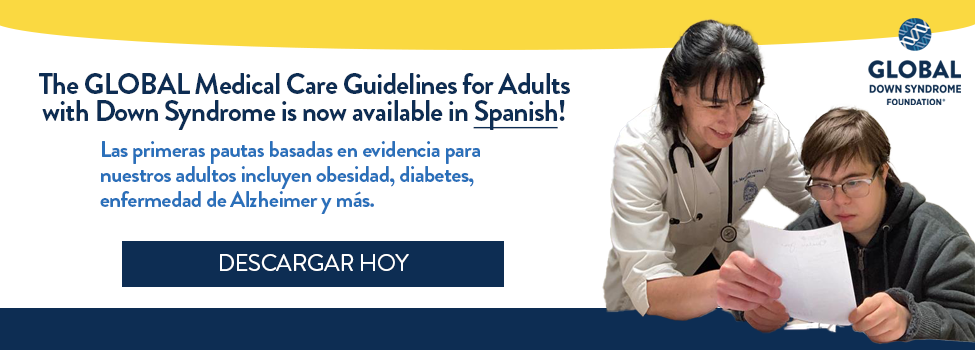
 Experience our inspirational and groundbreaking videos and photos. Our children and self-advocates are beautiful AND brilliant!
Experience our inspirational and groundbreaking videos and photos. Our children and self-advocates are beautiful AND brilliant! Make sure your local Representatives are on the Congressional Down Syndrome Task Force.
Make sure your local Representatives are on the Congressional Down Syndrome Task Force.